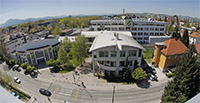Tanja Ažderska graduated System Engineering and Automation at the Faculty of Electrical Engineering and Information Technologies, University Ss. Cyril and Methodius – Skopje, Macedonia. She currently works in the Laboratory for Open Systems and Networks at Jožef Stefan Institute as a young researcher in the field of Internet trust, security and privacy. She is a doctoral student at Jožef Stefan International Postgraduate School in Ljubljana.
EDUCATION
- B. Sc., University Ss. Cyril and Methodius – Skopje, Macedonia, Faculty of Electrical Engineering and Information Technologies, 2004 – 2008
- Ph. D., Institute Jožef Stefan, Jožef Stefan International Postgraduate School, 2009 – >>> (expected: 2013)
PROFFESIONAL EXPERIENCES
Prior to the PhD studies:
- HMI programming of a touch screen terminal for a brick conveying plant in the factory for brick production “Džumajlija” – Lozovo, Macedonia;
- Wonderware InTouch SCADA programming for the whole technological process for cement production in the factory “Usje” – TITAN in Skopje, Macedonia (a snapshot of it is shown here);
- Temporal task-scheduling using Petri Nets;
During the PhD studies:
1. Talks and presentations:
- IPSCS 2010, 2nd Jozef Stefan International Postgraduate School Conference (poster presentation)
- Nineteenth International Electrotechnical and Computer Science Conference ERK 2010, 20-22 September 2010, Portorož, Slovenia
- FIA PPP Architecture Workshop, 9 June 2010, Madrid (position paper)
- 1st unite doctoral symposium, 27th – 29th June 2011, University Politehnica of Bucharest, Romania (paper presentation)
- 4th European Conference, ServiceWave 2011, Poznan, Poland, October 26-28, 2011
- CEPOL counters cyber-crime, European police college conference, 10 November 2011, Brdo pri Kranju (talk)
- 6th IFIPTM Conference on Trust management, May 21-25, 2012, Surat, India (paper presentation – virtual)
- CD-ARES 2012, International Cross Domain Conference, August 20-24, 2012, Prague, Czech Republic (paper-presentation)
- …and several Institute seminars
2. Other attended events:
- First ACTIVE Summer School on advanced technologies for a knowledge discovery in databases – Bled, 04-06 September 2009
- The Future Internet Assembly 2010, 15-16 April 2010, Valencia, Spain
- IPICS Summer School on Information and Communication Security, 19-30 July 2010, Samos, Greece
- ICT 2010, 27-29 September 2010, Brussels Expo, Brussels
- ServiceWave’10, 13-15 December 2010, Ghent
- IFIP WG 11.11 Summer School on Trust Management, Technical University of Denmark, Copenhagen, June 19 – 25, 2011
PROFESSIONAL SKILLS
- Cybernetics, Control Theory, Cellular Automata and General Systems Theory
- System Automation ( SCADA system design, PLC process automation)
- Trust and Reputation Management
- Probabilistic Reasoning and Information Fusion
- Social Network Analysis
- Languages: Advanced English, Basic Spanish, all the Balkan languages
COMPUTER SKILLS
- Programming (C, C++, Matlab, NetLogo(Lisp-based))
- HMI Programming, PLC Programming
- Machine Learning
- System Analysis
HONORS AND AWARDS
- Member of the Macedonian HST (High Speed Telegraphy) Representation
- 4 times setting a World record in High Speed Telegraphy, numerous World and European Championship medals, Absolute National Champion
- Winner of regional and national competitions in Math, Physics and Scientific Writing
HOBBIES
- High Speed Telegraphy (HST) – Morse Code
- Handball, Gymnastics, Music instruments (mandolin and guitar)
- Math, Physics, Literature (reading and writing), Music (listening and playing)
RESEARCH INTERESTS
The major part of my research is analysing the micro and macro-behavioural phenomena in computational trust and reputation systems, in particular their causal relationship to user bias . In that regard, my research interests include:
- Trust: socio-cognitive aspects, computational analogue of trust, its applicability and non-applicability in a virtual setting (“artificial trust”), contextual trust-reasoning;
- Reputation systems: the impact of scale, context, dynamics, privacy, risk;
- Cybernetic principles of trust systems design;
- Trust as an emergent systemic property: micro-incentives (of the system entities) and macro-behaviour (of the system)
- Information Fusion and Soft Computing
- The compatibility and interchangeability between traditional and computational social networks’ premises and methodologies
The major sources for my thoughts:
- History and Philosophy of Science
- Principles of (self)sustainability
- Complexity and Cybernetics
- Probability Theory – history, foundations and generalisations
- Sociology and Network Theory


